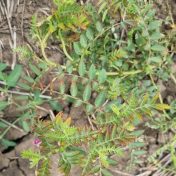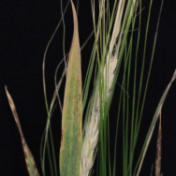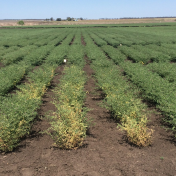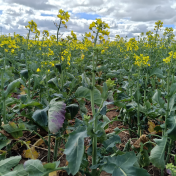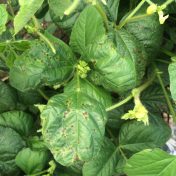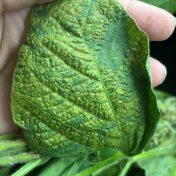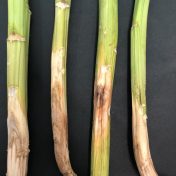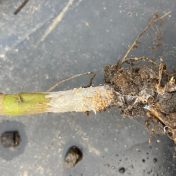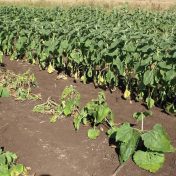A recent survey of chickpea fields across the Darling Downs, including areas around Dalby, Cecil Plains, and Chinchilla, has revealed the presence of several viruses affecting chickpea crops. Among the viruses detected were alfalfa mosaic virus (AMV), phasey bean mild yellows virus (PBMYV), turnip yellows virus (TuYV), and bean leaf roll virus (BLRV). Alfalfa mosaic virus (AMV) AMV was the… Read more »
A recent survey of six fields across the Darling Downs and northern New South Wales has confirmed the presence of BVG (in all six fields), with varying levels of infection. The fields surveyed were spread across key cropping areas, including regions around Goondiwindi, Tara, and greater Dalby. This widespread detection highlights the need to remain vigilant and monitor crops closely…. Read more »
Chickpea growers need to stay vigilant for fungal diseases, especially as crop canopies close and wet weather and heavy dews occur. Recent reports from central Queensland have highlighted cases of white mould caused by Sclerotinia spp. Meanwhile, wet conditions in southern Queensland have led to instances of phytophthora root rot in susceptible paddocks. Across all regions, growers should also monitor… Read more »
More growers are planting canola in southern Queensland this season, so it’s important to be on the lookout for turnip yellows virus (TuYV) – one of the main viral threats to canola. What is TuYV and why does it matter? TuYV is a persistent virus that affects canola and other brassica crops. It is transmitted by green peach aphids (GPA,… Read more »
Powdery mildew is a fungal disease that is commonly seen each cropping season in most mungbean paddocks in Australia. In Queensland and northern New South Wales, disease outbreaks usually occur from early autumn in the summer planted crops, with epidemics typically developing as soon as temperatures drop. Initial symptoms are easy to recognise: small whitish, powdery spots on the upper… Read more »
A wet spring has led to outbreaks of halo blight in several spring-planted mungbean crops throughout southern Queensland. Tan spot has also been detected in some crops. Avoid replanting seed from crops affected with halo blight and tan spot and minimise the spread of these diseases by restricting access and ensuring good farm hygiene. Avoid movement through infected paddocks and… Read more »
Earlier this year, the Queensland Department of Primary industry (DPI) pathology team received samples of soybean with virus-like symptoms. Diseased plants displaying strong chlorotic mottle on leaves and leaf crinkling (see images below) were scattered through the crop. While the samples tested positive in a polymerase chain reaction (PCR) test for potyvirus, the actual species remained a mystery. Subsequent sequencing… Read more »
Recent weather conditions have led to isolated outbreaks of two fungal diseases, fusarium crown rot and sclerotinia stem rot, in several grain crops across southern Queensland. Crown rot Crown rot, primarily caused by Fusarium pseudograminearum, has been detected in several barley crops across southern Queensland, but other winter cereal crops and regions are also at risk. Initial disease symptoms include… Read more »
Warm, wet conditions have led to isolated outbreaks of the fungal pathogen, Sclerotium rolfsii, in sorghum and grain legume crops across southern Queensland (although other regions are also at risk) and several disease outbreaks in mungbean crops growing throughout Queensland and northern New South Wales. Sclerotium rolfsii Sclerotium is a soilborne pathogen that can infect a wide range of plant… Read more »
The recent declaration of El Niño conditions for eastern Australia means an increased chance of below average rainfall. Historically, these conditions can lead to more severe outbreaks of tobacco streak virus. However, with forward planning and selection of suitable sunflower hybrids, the risk of economic impacts from TSV can be avoided. If sunflowers crops are planned for early 2024 in… Read more »
